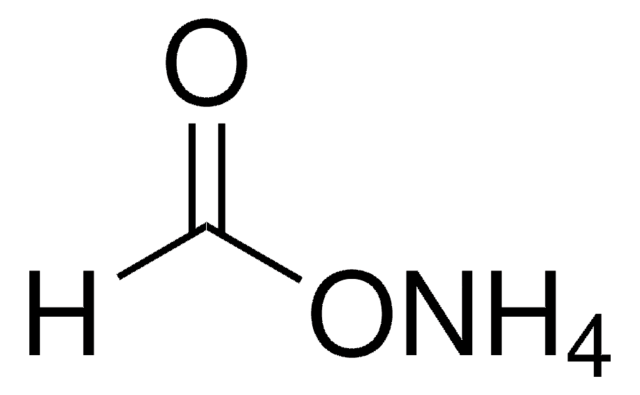20801
1,1,1-Trichloro-2-methyl-2-propanol hemihydrate
meets analytical specification of Ph. Eur., BP, NF, 98-100.5% (calc with ref. to anhyd. subst.)
Sinónimos:
β,β,β-Trichloro-tert-butyl alcohol hemihydrate, ‘Acetone chloroform’, ‘Chlorobutanol’
About This Item
Productos recomendados
Nivel de calidad
Ensayo
98-100.5% (calc with ref. to anhyd. subst.)
Formulario
solid
calidad
meets analytical specification of Ph. Eur., BP, NF
impurezas
≤0.002% heavy metals (as Pb)
4.5-5.5% water (Karl Fischer)
residuo de ign.
≤0.1% (as SO4)
mp
76-80 °C
trazas de anión
chloride (Cl-): ≤100 mg/kg
aplicaciones
pharmaceutical (small molecule)
cadena SMILES
O.CC(C)(O)C(Cl)(Cl)Cl.CC(C)(O)C(Cl)(Cl)Cl
InChI
1S/2C4H7Cl3O.H2O/c2*1-3(2,8)4(5,6)7;/h2*8H,1-2H3;1H2
Clave InChI
WRWLCXJYIMRJIN-UHFFFAOYSA-N
¿Está buscando productos similares? Visita Guía de comparación de productos
Aplicación
Acciones bioquímicas o fisiológicas
Palabra de señalización
Warning
Frases de peligro
Consejos de prudencia
Clasificaciones de peligro
Acute Tox. 4 Oral
Código de clase de almacenamiento
11 - Combustible Solids
Clase de riesgo para el agua (WGK)
WGK 3
Punto de inflamabilidad (°F)
212.0 °F - closed cup
Punto de inflamabilidad (°C)
100 °C - closed cup
Equipo de protección personal
dust mask type N95 (US), Eyeshields, Gloves
Elija entre una de las versiones más recientes:
¿Ya tiene este producto?
Encuentre la documentación para los productos que ha comprado recientemente en la Biblioteca de documentos.
Los clientes también vieron
Nuestro equipo de científicos tiene experiencia en todas las áreas de investigación: Ciencias de la vida, Ciencia de los materiales, Síntesis química, Cromatografía, Analítica y muchas otras.
Póngase en contacto con el Servicio técnico








